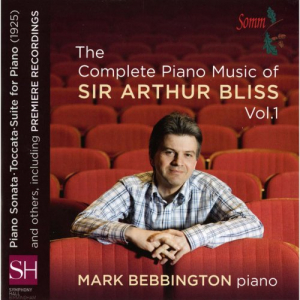Mark Bebbington - The Complete Piano Music of Sir Arthur Bliss, Vol. 1 '2012

| Artist | Mark Bebbington Related artists |
| Album name | The Complete Piano Music of Sir Arthur Bliss, Vol. 1 |
| Country | |
| Date | 2012 |
| Genre | Classical Piano |
| Play time | 01:14:10 |
| Format / Bitrate | Stereo 1420 Kbps
/ 44.1 kHz MP3 320 Kbps |
| Media | CD |
| Size | 233 mb |
| Price | Download $1.95 |
Order this album and it will be available for purchase and further download within 12 hours
Pre-order album Tracks list
Tracks list
Tracklist 01. Valses fantastiques: I. Allegretto amabile 02. Valses fantastiques: II. Poco più andante 03. Valses fantastiques: III. Poco lento e molto espressivo 04. Valses fantastiques: IV. Introduction. Moderato 05. Toccata 06. Intermezzo 07. Study 08. Piano Sonata: I. Moderato marcato 09. Piano Sonata: II. Adagio sereno 10. Piano Sonata: III. Allegro 11. May-Zeeh 12. Suite for Piano: I. Overture. Allegro 13. Suite for Piano: II. Polonaise. Alla polacca 14. Suite for Piano: III. Elegy 15. Suite for Piano: IV. Variations 16. Miniature Scherzo Volume One of the first ever complete recording of the solo piano music by Sir Arthur Bliss, and includes world premiere recordings of many of Bliss’s early piano works. Volume 2 will be released at the end of the year. Although Bliss is largely remembered today for his magnificent collection of orchestral and chamber works – many of them dating from his period as Master of the Queen’s Music from 1953 until his death in 1975 – his piano music has been scandalously and unaccountably neglected. â€There is absolutely no accounting for the neglect of this wonderful body of piano musicâ€, says Bebbington. “The piano music charts his growth as a composer better than any of his other music….and the big piano works – the Piano Sonata and 1925 Suite, for example – are every bit the equal of his more popular and well known scores, for example, A Colour Symphony and Morning Heroes. Bliss ranks alongside Bridge as perhaps the only British composer of last century who represents an individual musical personality, yet with a full awareness of European, American and Russian musical developments; there is nothing remotely insular or ‘British’ in the piano music of Bliss. Here we find the influences of Stravinsky, Alban Berg…..Charlie Chaplin and George Gershwin – all filtered through one of the most strikingly individual voices from this country.†Bebbington first became interested in Bliss following a chance meeting a few years ago with the chairman of The Arthur Bliss Society. Under the Society’s watchful guidance, photocopies of Bliss’ early, unpublished piano works were made available to him. And so the seeds of an integrale recording were sown. To mark the issue of this two CDs to be released in two separate volumes, The Bliss Trust is publishing for the first time the complete cycle of the composer’s solo piano music. The music on Volume 1 is a fantastic mix of styles and influences – beginning with Bliss’s earliest piano work, a charming and previously unrecorded salon Waltz â€May-Zeeh†(1910), with a touching dedication to an early girlfriend, A far cry from the zany works of his youth is the monumental Piano Sonata of 1952. The sheer pianistic complexity of this magnificent work owes much to the awesome keyboard reputation of its dedicatee, Noel Mewton-Wood. Newton-Wood was something of a cult figure during his short, brilliant, but ill-starred life. His early pianistic precocity singled him out for nurturing by leading British composers of the day – including Bliss and Tippett – but his huge talent was dogged by manic depression and he committed suicide in 1953 at the age of 31. The Piano Sonata was written for Newton-Wood as a heartfelt thank you to him for his pioneering performances of Bliss’s earlier Piano Concerto (1938) and it shares with that work both an epic grandeur and pianistic panache and flamboyance. The remaining works on Bebbington’s CD which was recorded in Birmingham’s Symphony Hall during August 2010 and January 2011 include many gems along the way – a malevolent virtuoso Toccata from 1925, every bit the equal of Prokoviev’s work of the same name and dedicated to his new American wife Gertrude Hoffmann; a delicious, previously unrecorded Intermezzo, also dating from his late teens, which shows clearly the influence of Brahms on the young Bliss and the wonderful, Ravel inspired Valses Fantastiques (1912) – a homage to the French composer’s Valses Nobles et Sentimentales and also a recorded premiere. The Suite of 1925 is one of Bliss’s most substantial solo piano works; the overall feel of the music is strongly neo-classical, but as with so much of Bliss’s piano music, there is a sense of unease that belies the overall optimistic mood. There is, then, no doubting the tragic character of the third movement Elegy, headed ‘F.K.B. Thiepval, 1916’, a reference to the death of his beloved brother Kennard who was killed in action. Bliss’s autobiography As I Remember contains a striking early reminiscence….. “I like to imagine that the first sounds of music I ever heard came from my mother’s fingers as she practised the piano.†It is ironic that Bliss is now so little remembered for his piano works – when clearly the sound of the instrument was shaping those early years. With this first ever integrale of his piano music, a comprehensive evaluation of one of this country’s great composers – and, in particular the true significance of Bliss’s contribution to twentieth-century piano repertoire – can now take place.
